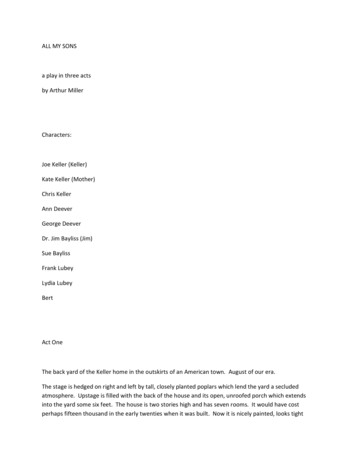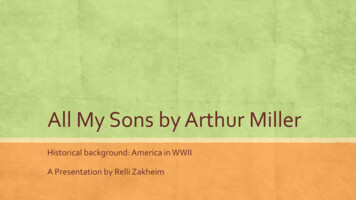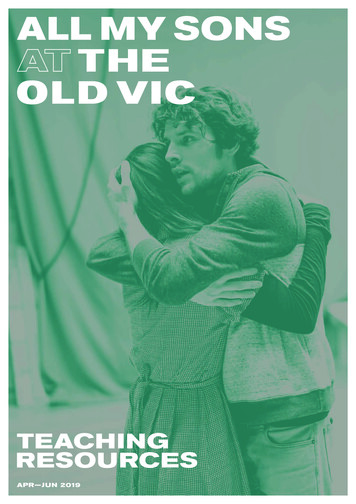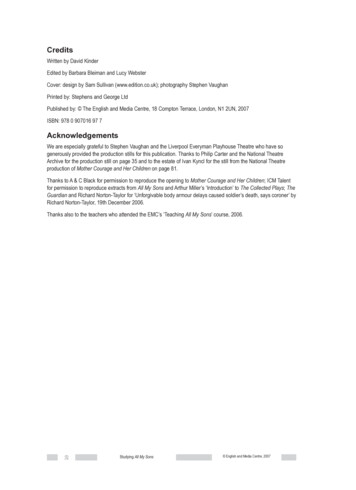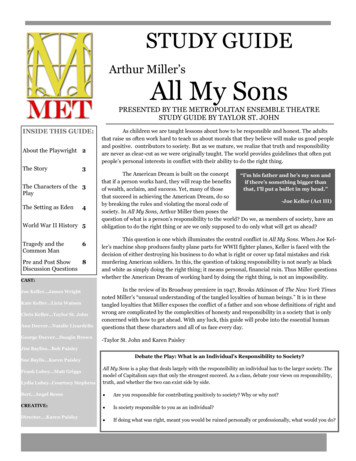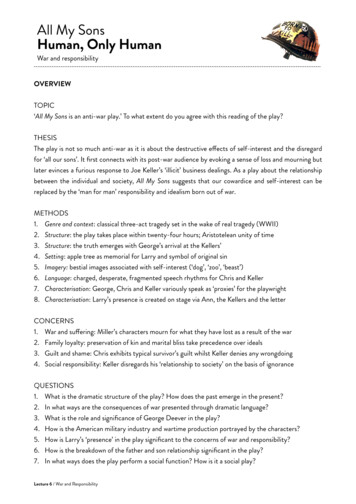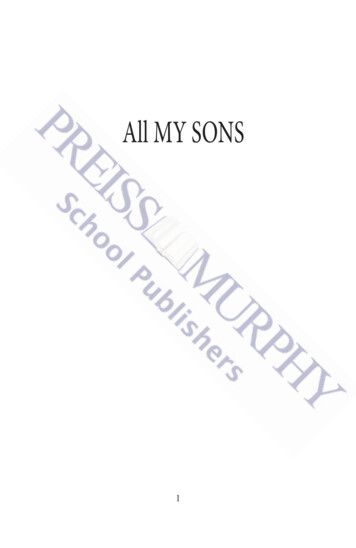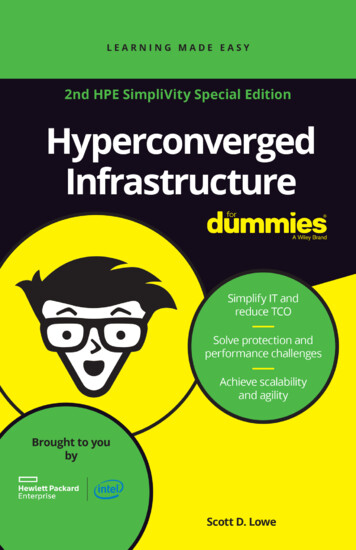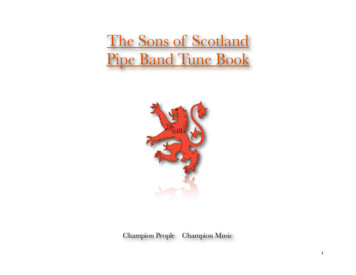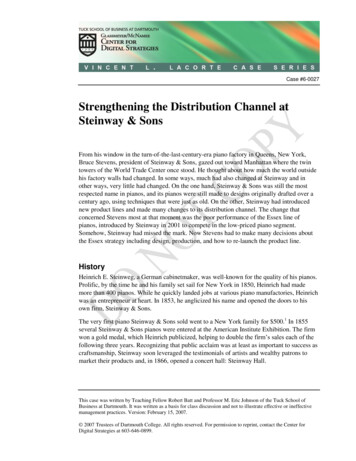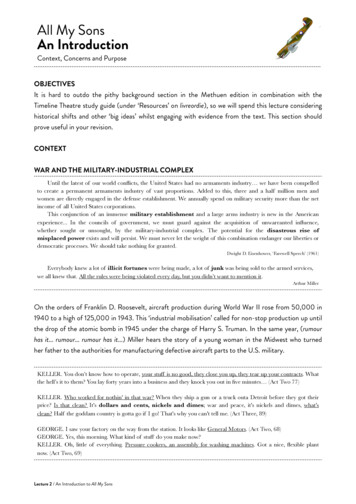
Transcription
All My SonsAn IntroductionContext, Concerns and PurposeOBJECTIVESIt is hard to outdo the pithy background section in the Methuen edition in combination with theTimeline Theatre study guide (under ‘Resources’ on livreordie), so we will spend this lecture consideringhistorical shifts and other ‘big ideas’ whilst engaging with evidence from the text. This section shouldprove useful in your revision.CONTEXTWAR AND THE MILITARY-INDUSTRIAL COMPLEXUntil the latest of our world conflicts, the United States had no armaments industry we have been compelledto create a permanent armaments industry of vast proportions. Added to this, three and a half million men andwomen are directly engaged in the defense establishment. We annually spend on military security more than the netincome of all United States corporations.This conjunction of an immense military establishment and a large arms industry is new in the Americanexperience. In the councils of government, we must guard against the acquisition of unwarranted influence,whether sought or unsought, by the military-industrial complex. The potential for the disastrous rise ofmisplaced power exists and will persist. We must never let the weight of this combination endanger our liberties ordemocratic processes. We should take nothing for granted.Dwight D. Eisenhower, ‘Farewell Speech’ (1961)Everybody knew a lot of illicit fortunes were being made, a lot of junk was being sold to the armed services,we all knew that. All the rules were being violated every day, but you didn’t want to mention it.Arthur MillerOn the orders of Franklin D. Roosevelt, aircraft production during World War II rose from 50,000 in1940 to a high of 125,000 in 1943. This ‘industrial mobilisation’ called for non-stop production up untilthe drop of the atomic bomb in 1945 under the charge of Harry S. Truman. In the same year, (rumourhas it. rumour. rumour has it.) Miller hears the story of a young woman in the Midwest who turnedher father to the authorities for manufacturing defective aircraft parts to the U.S. military.KELLER. You don’t know how to operate, your stuff is no good, they close you up, they tear up your contracts. Whatthe hell’s it to them? You lay forty years into a business and they knock you out in five minutes (Act Two 77)KELLER. Who worked for nothin' in that war? When they ship a gun or a truck outa Detroit before they got theirprice? Is that clean? It's dollars and cents, nickels and dimes; war and peace, it's nickels and dimes, what'sclean? Half the goddam country is gotta go if I go! That's why you can't tell me. (Act Three, 89)GEORGE. I saw your factory on the way from the station. It looks like General Motors. (Act Two, 68)GEORGE. Yes, this morning. What kind of stuff do you make now?KELLER. Oh, little of everything. Pressure cookers, an assembly for washing machines. Got a nice, flexible plantnow. (Act Two, 69)Lecture 2 / An Introduction to All My Sons
With destruction comes creation. Factories like Joe Keller’s were born of wartime and continued toprosper post-WWII, shifting into consumer goods—a keystone of the American Dream.THE AMERICAN DREAMWith the military-industrial complex and an American economy on the up-and-up, it is unsurprisingthat the period after WWII was one of immense affluence for middle America. Statistics tell the story: 213 billion GDP in 1945 grew to 500 billion in 1960; the middle class composed an unprecedented60% of the population; 62% of families owned a home by 1960 (from a mere 43% in 1940). Domesticconsumption, especially of consumer appliances like washing machines and refrigerators, sky-rocketed.Prosperity in the American post-WWII milieu was not just a goal of every citizen; the opportunity of‘living the American dream’ would come to be recognised as an inalienable right.The American Dream is that dream of a land in which life should be better and richer and fuller foreveryone, with opportunity for each according to ability or achievement. It is a difficult dream for the Europeanupper classes to interpret adequately, and too many of us ourselves have grown weary and mistrustful of it. It is not adream of motor cars and high wages merely, but a dream of social order in which each man and each woman shallbe able to attain to the fullest stature of which they are innately capable.James Truslow Adams, Epic of America, (1931)We hold these truths to be self-evident, that all men are created equal, that they are endowed by their creatorwith certain unalienable Rights, that among these are Life, Liberty, and the pursuit of Happiness.United States Declaration of Independence (1776)The financial struggle that the average American today suffers is not apparent to the audience from theopening. The Kellers live a ‘nice’ and ‘comfortable’ life that they seek to maintain while their neighbourspast and present—the Deevers and the Baylisses—are considerably less fortunate.The house is two stories high and has seven rooms. It would have cost perhaps fifteen thousand in the early twenties when it was built.Now it is nicely painted, looks tight and comfortable, and the yard is green with sod. (Act One, 3)ANN. Because you have a right to whatever you have. Everything, Chris, understand that? ( )CHRIS. Oh Annie, Annie. I'm going to make a fortune for you! (Act One, 38)KELLER. I want a clean start for you, Chris. I want a new sign over the plant—Christopher Keller, Incorporated.CHRIS (a little uneasily). J. O. Keller is good enough.KELLER. We’ll talk about it. I’m going to build you a house, stone, with a driveway from the road (Act One, 41)THE NUCLEAR FAMILYThe Cold War (1945-1991?), or the period after WWII, arguably led to a fundamental change in thesocial structure. The typical family unit was less the multi-generational tapestry of yore and more thefather-mother-two children ‘nuclear’ model of four. This in turn fuelled the frenetic consumption(more homes, more cars, more appliances) that fermented an increasingly materialistic society.The image of the American nuclear family has clearly evolved from the ‘ideal’ state in Leave It to Beaver(1957), the dysfunctional suburban family in The Simpsons (1989), single-parent family in Gilmore Girls(2000) to the whimsical chaos of Keeping Up with the Kardashians (2007).Lecture 2 / An Introduction to All My Sons2
MOTHER. If he ate in my house [George]'d have an appetite. (to Ann) I pity your husband! (To George) Sit down. I'llmake you a sandwich. [.]GEORGE (with deep feeling for her) You. you haven't changed at all, you know that, Kate?MOTHER. None of us changed, Georgie. We all love you. (Act Two, 63)CHRIS (with admiration). Joe McGuts. (Act One, 32)ANN. You’re the only one I know who loves his parents. (Act One, 35)THE SOCIAL CONTRACTThe social contract, defined in the simplest terms, is the unwritten acceptance that the individual isbound to the rules set by the collective (social group, society, nation, universe). An individual, inessence, exchanges some personal liberty for the security afforded by the group.The idea of the social contract goes back, in a recognisably modern form, to Thomas Hobbes; it was developedin different ways by John Locke, Jean-Jacques Rousseau, and Immanuel Kant. After Kant the idea largely fell intodisrepute until it was resurrected by John Rawls. It is now at the heart of the work of a number of moral and politicalphilosophers. The basic idea seems simple: in some way, the agreement (or consent) of all individuals subject tocollectively enforced social arrangements shows that those arrangements have some normative property (they arelegitimate, just, obligating, etc.).Stanford Encyclopedia of PhilosophyThe Hobbesian view has been widely interpreted as one where humans ‘are necessarily and exclusivelyself-interested. All men pursue only what they perceive to be in their own individually considered bestinterests’ (Internet Encyclopedia of Philosophy). This which we call the Hobbesian State of Nature is, wespeculate, the ingrained norm in Miller’s 1947 America: the average Joes of that world pursue their ownends without regard for their fellow man, justifying this with the poignant but lame reason of family.On the other hand, Locke’s treatise on the State of Nature assumes that we are ‘free to pursue our owninterests and plans’ but do so under the premise that we must not harm others with regard to their ‘life,health, liberty or possessions’. The goodwill in Locke’s premise, echoed in Chris’s idealistic Obama-typespeeches, is evidently eviscerated in the play.CONCERNSThis is also a play about betrayal, about fathers and sons, about America, about self-deceit, about self-righteousness,about egotism presented as idealism, about a fear of mortality, about guilt, about domestic life as evasion, aboutthe space between appearance and reality, about the suspect nature of language, about denial, about repression,about a kind of despair finessed into hope, about money, about an existence resistant to our needs, about a wish forinnocence when, as Miller was later to say in his autobiography, innocence kills, about a need for completion, aboutthe gulf between the times we live in and the people we wish to believe ourselves to be, about the fragility of whatwe take to be reality, about time as enemy and time as moral force and so on.Christopher Bigsby, Arthur Miller: A Critical StudyTHE FAMILY - FATHERS AND SONSOne might argue that All My Sons is an essentially private tragedy concerned about one family’s loss andthe ghost of the past that haunts them. Like Death of a Salesman, familial relationships are examinedunder Miller’s microscope.Lecture 2 / An Introduction to All My Sons3
KELLER. You get older, you want to feel that you -- accomplished something. My only accomplishment is myson. I ain't brainy. That's all I accomplished.(Act Two, 53)CHRIS. I know you're no worse than most men but I thought you were better. I never saw you as a man. I saw youas my father. (Act Three, 89)KELLER. Nothin's bigger than that. And you're going to tell him, you understand? I'm his father and he's myson, and if there's something bigger than that I'll put a bullet in my head! (Act Three, 83)SOCIAL RESPONSIBILITY VS TRIBALISMThe play ‘forcefully repudiates anti-social behaviour that derives from the myth of privatism inAmerican society’. Chris believes whole-heartedly in one’s obligation to the greater world and the needfor sacrifice, whereas Joe represents the self-centred notion of caring only for one’s own ‘sons’.CHRIS. They didn't die; they killed themselves for each other. I mean that exactly. a little more selfish and they'd'vebeen here today. And I got an idea .watching them go down. Everything was being destroyed, see, but it seemed tome that one new thing was made. A kind of—responsibility. Man for man. (Act One, 38)KELLER (looking at letter in his hand). Then what is this if it isn't telling me? Sure, he was my son. But I think to himthey were all my sons. And I guess they were, I guess they were. (Act Three, 90)KELLER. Chris. Chris, I did it for you, it was a chance and I took it for you. I'm sixty one years old, when wouldI have another chance to make something for you? (Act Two, 77)MOTHER. We’re dumb, Chris. Dad and I are stupid people. We don’t know anything. You’ve got to protect us. (44)All My Sons thus ‘lays siege to the fortress of unrelatedness’ and shows why an individual’s betrayal ofthe social contract and in so doing, relinquishes the responsibility for others will lead to the ‘zoo’ Chrishowls about and the ‘jungle existence for all of us’ that Miller himself writes of—a carnivorous, dog-eatdog world devoid of affiliation with another man, one’s ‘country’ and the ‘world’.IDEALISM VS MATERIALISMIt is through the tragic hero of Chris that the play exhorts its audience to take up its social and moralcause. His aspirations towards self-sacrifice (instead of self-gain) and humanity (instead of materialachievement) are admirable but are contradicted by his desire to live the American Dream with Ann.CHRIS (with burning fury). For me! Where do you live, where have you come from? For me! .I was dying every dayand you were killing my boys and you did it for me? What the hell do you think I was thinking of, the goddambusiness? Is that as far as your mind can see, the business? What is that, the world of business? Don’t you havea country? Don’t you live in the world? (Act Two, 78)CHRIS. You can be better! Once and for all you can know there's a universe of people outside and you'reresponsible to it, and unless you know that, you threw away your son because that's why he died. (Act Three, 91)ANN. And the money, there's nothing wrong in your money. Your father put hundreds of planes in the air, youshould be proud. A man should be paid for that. (Act One, 38)Lecture 2 / An Introduction to All My Sons4
DENIAL AND DECEPTION VS TRUTH AND REVELATIONFor Steven Centola, the past in All My Sons is ‘always present and cannot be ignored, forgotten ordenied’. Kate’s seemingly innocent self-delusion - her means of coping with loss - hides an underlyinglayer of bullying and outright mendacity. Joe and Chris are complicit in Kate’s fantasy as they repressthe past and by extension, the truth. By the end of the play, we see that everyone is guilty.SUE. Then why don't you go out and talk to people? Go on, talk to them. There's not a person on the block whodoesn't know the truth. (Act Two, 49)KELLER. Kid, walkin' down the street that day I was guilty as hell. Except I wasn't, and there was a court paper inmy pocket to prove I wasn't (Act One, 40)CHRIS. You have such a talent for ignoring things.KELLER. I ignore what I gotta ignore. (Act One, 15)GUILT AND SHAME VS ATONEMENT AND PENANCE‘Indeed’, Christopher Bigsby argues, ‘no one in this play is without culpability, without cruelty, withoutguilt’, a claim that Sue’s aforementioned indictment implies. The entire community, including theBaylisses and the Lubeys, i
All My Sons An Introduction Context, Concerns and Purpose OBJECTIVES It is hard to outdo the pithy background section in the Methuen edition in combination with the Timeline Theatre study guide (under ‘Resources’ on livreordie), so we will spend this lecture considering historical shifts and other ‘big ideas’ whilst engaging with evidence from the text. This section should prove useful .
